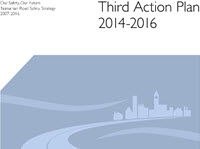
Nov 25, 2014 | Espanol news
A través del programa ANRAM, las autoridades viales a nivel estatal en Australia utilizan cada vez más un enfoque consistente a nivel nacional para identificar y mejorar los tramos de vías que tienen un mayor riesgo de colisiones severas.
En el estado de Tasmania, por ejemplo, el Tercer Plan de Acción para la seguridad vial permitirá mejorar las clasificaciones por estrellas para las autopistas de Tasmania, y en particular, reducir el porcentaje de carreteras clasificadas con 1 y 2 estrellas.
Esta acción forma parte de los esfuerzos para promover el uso de ‘las mejores prácticas en infraestructura’ y reducir en 20% las lesiones graves y muertes entre 2010 y 2015.

Nov 25, 2014 | News
Through the ANRAM program, state-based road authorities in Australia are increasingly using a nationally-consistent approach to identify and improve road sections with the highest risk of severe crashes.
In the State of Tasmania for example, the Third Action Plan for road safety will see improvement of Star Ratings for Tasmanian highways, and in particular, a lowering of the percentage of 1 and 2 star rated highways.
This action is part of efforts to promote the use of ‘best practice infrastructure’ and reduce serious injuries and fatalities by 20% between 2010 and 2015.

Nov 25, 2014 | Espanol news
El Ministro de Obras Públicas y Transporte, HE Tram Iv Tek, y funcionarios de alto nivel recientemente se reunieron con iRAP para discutir oportunidades para prevenir traumatismos en las vías de Camboya.
La Organización Mundial de la Salud estima que Camboya ha reportado una tasa de mortalidad en las vías de 17.2 muertes por 100,000 habitantes en 2010. Nosotros hemos estimado que las muertes y lesiones graves cuestan $474 millones al año, o el equivalente al 4% del PIB.
Al dirigirse a los participantes en la reunión, el ministro manifestó que las muertes ocasionadas por accidentes viales requerían mayor atención y exhortó a los ingenieros viales del Departamento que presten más atención a la calidad y seguridad de las vías.
Las reuniones se llevaron a cabo junto con un proyecto de hermanamiento entre Países Bajos y Camboya de la OECD ITF que incluye a , Handicap Internationaly GRSP.

Nov 25, 2014 | News
Minister for Public Works and Transport, HE Tram Iv Tek, and senior officials recently met with iRAP to discuss opportunities to prevent road trauma in Cambodia.
The World Health Organization estimates that Cambodia experienced a road death rate of 17.2 deaths per 100,000 population in 2010. We estimate that deaths and serious injuries cost $474 million a year, or the equivalent of 4% of GDP.
Speaking during the meeting, the Minister said deaths from traffic crashes accounted for much-needed attention and urged the Department’s road engineers to pay high attention to the quality and safety of the roads.
The meetings were held in conjunction with an OECD ITF Netherlands-Cambodia twinning project involving Road Safety For All, Handicap International and GRSP.
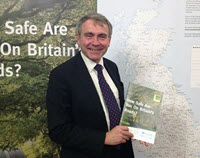
Nov 24, 2014 | Espanol news
El 13vo informe anual de British EuroRAP identifica 15 tramos de carreteras donde las autoridades tomaron acciones con un costo relativamente bajo que permitieron reducir las colisiones mortales y graves en 80%.
El número de personas que murieron y resultaron gravemente lesionadas en estos tramos se redujo de 237 a 52, permitiendo un ahorro estimado en £400 millones y evitando un dolor incalculable.
Making Road Safety Pay hace siete recomendaciones clave cuyo objetivo es cambiar la manera en que el Reino Unido abordará el tema de la seguridad en la próxima década.
Las recomendaciones incluyen establecer objetivos de Clasificación por Estrellas, una estrategia nacional para conductores de mayor edad, reducir el impuesto sobre las primas de seguro para vehículos equipados con nuevas tecnologías que salvan vidas y una prueba con bonos innovadores que tienen un impacto social y que se usarán para financiar mejoras a la seguridad vial.

Nov 24, 2014 | News
The 13th annual British EuroRAP report identifies 15 stretches of road where authorities tok relatively low cost action that reduced fatal and serious crashes by 80%.
The number of people killed and seriously injured on these stretches dropped from 237 to 52, saving an estimated £400 million and preventing immeasurable grief.
Making Road Safety Pay makes seven key recommendations which aim to change the UK’s focus on road safety over the next decade.
Recommendations include setting Star Rating targets, a national older driver strategy, cutting insurance premium tax for vehicles fitted with new life-saving technology and a trial of innovative social impact bonds to fund road safety improvements.

Oct 8, 2014 | News
Recent upgrades to the iRAP online software, ViDA, mean that for the first time everyone will be able to access interactive Road Data, Star Rating and Safer Roads Investment Plan reports online.
An important goal for iRAP is to ensure that everyone, whether it’s a transport minister, engineer, treasury official or road safety advocate, who has the potential to improve road infrastructure safety and save lives is able to access the results they need.
At the same time, Managers are empowered with a greater ability to control the level of access that people have to their data. Managers can choose options ranging from completely secure, private access for sensitive data to completely open, publicly-available access to results that complement a written report.
These upgrades are part of our continuous efforts to better meet the needs of road authorities, motoring clubs, research institutes and non-government organisations.
The upgrades outlined here apply only to the ViDA software. They do not affect the iRAP methodology (that is, they do not affect how Star Ratings and Safer Roads Investment Plans (SRIP) are calculated).
We hope you enjoy using the newly updated ViDA software. If you have any comments or suggestions, please don’t hesitate to contact me.
James Bradford
Global Operations Manager
New dashboard
We’ve created a new, easy to use dashboard that contains links to all the tools you’ll need.
The dashboard also includes “News” and “Activity feed” sections that provide the latest information.
New types of accounts
We’ve introduced three new types of accounts.
Reader Account – is for those who want to look at high-level reports (for example, members of the public, project stakeholders). This account allows you to view Final Published results and request access to Final Unpublished results. You can filter Road Data, Star Rating and SRIP reports to the Dataset level.
Analyst Account – is for those who want to look at detailed reports (for example, researchers, road authority engineers, project partners). This account is the same as the Reader Account, but adds the ability to filter Road Data, Star Rating and Investment Plan reports to the Road and Section levels. You can also access Download files.
Creator Account – is for those who want to create reports (for example, Road Assessment Programme managers, road designers, road safety auditors). This account is the same as the Analyst Account, but adds the ability to create and edit Datasets and produce reports. Note that the creation of a dataset requires the permission of the Project Manager, and the creation of a Project requires the permission of the Region Manager.
After logging in, you can check your account type by clicking on your name and selecting My Profile.
Existing users
If you currently have access to ViDA, your old account will automatically be transferred to one of the new accounts.
- Practioners are assigned a Reader Account.
- Managers are assigned an Analyst Account.
- Administrators are assigned a Creator Account.
New license agreement
We have created a new primary license agreement that sets out terms and conditions for use of ViDA.
All users of ViDA, including existing users, are required to agree to the terms and conditions. You will be prompted to do this the first time you login to the updated system. There is no cost for this license.
Anyone can apply for a Reader Account
By clicking ‘Register’ on the newly designed homepage and agreeing to the terms and conditions, anyone can now become a ViDA user.
By default all new ViDA users are assigned a Reader Account. If you want to access data in greater detail, you can request that your account is upgraded to an Analyst Account, or if you want to be able edit data, you can further request an upgrade to a Creator Account. Requests for account upgrades are considered by iRAP and can be made using the Upgrade Account button available on the new dashboard. After you have upgraded your account you are able to submit requests for access to reports.
Managers
It is now possible to specify who the Manager of a Road Assessment Program (RAP), Region, Project and Dataset is.
Managers are Creator Account holders that have the ability to assign other users with access to the data they are responsible for. The Manager may choose a level of access that is equal to or below the user’s account level. For example:
- A Programme Manager could assign an Analyst Account holder with Analyst level access to results for a Dataset within their Programme (that is, read only).
- A Project Manager could assign a Creator Account holder with Creator level access to a Dataset within their Project (that is, the ability to edit).
- A Dataset Manager could assign a Creator Account holder with Reader level access to results for their Dataset (that is, read only).
Dataset Managers can also set the status of their Datasets.
Setting the status of Datasets
Dataset Managers can now set the status of their Dataset.
There are five options:
- Working. This option is used when analyses are still being done. Reports are only available to those who have been assigned access, and the dataset name is not listed in the “Request Access” list (that is, the Dataset is not visible to other users).
- Draft. This option is used when the results are ready to be shared in draft format. Reports are only available to those who have been assigned access, and the Dataset is not listed in the “Request Access” list.
- Final Hidden. This option is used when the analyses are complete. Reports are only available to those who have been assigned access, and the Dataset is not listed in the “Request Access” list.
- Final Unpublished. This option is used when the analyses are complete but reports are not published. Reports are only available to those who have been assigned access, but the Dataset is listed in the “Request Access” list, enabling any ViDA user to request access to it. Dataset managers can approve or decline access as desired.
- Final Published. This option is used when the analyses are complete and reports are openly available. Standard “Final Published” reports are available to all ViDA users, and the Dataset is listed “Request Access” list, enabling any ViDA user to request access to it. Datasets may only be set to “Final Published” in agreement with the corresponding a Road Assessment Programme Manager and are subject to quality assurance checks.
Dataset status is set on the Dataset setup page. This can be accessed by selecting the “Project Setup & Access” button on the Dashboard, then navigating down to the Project, and then selecting edit from the dataset menu.
Anyone can request access to reports
All account holders can now use the “Request Access” button on the Dashboard to request access to standard suites of reports.
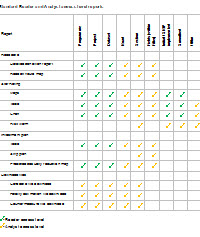 All account holders automatically gain access to a standard suite of Reader level access reports for Final Published Datasets.
All account holders automatically gain access to a standard suite of Reader level access reports for Final Published Datasets.
Additionally:
- Reader Account holders may request Reader level access to Final Unpublished Datasets.
- Analyst and Creator Account holders may request Reader or Analyst level access to Final Published and Final Unpublished Datasets.
When making your request, you have the option of writing a supporting statement explaining, for example, why you would like access to the Dataset. You’ll be notified about the decision via the Activity feed on the Dashboard and by email. In the future, Creator Account holders will be able to request Creator level access to Datasets.
* For Creator Account holders the “Request Access” button is combined into the “Project Setup & Access” button.
Dataset managers are responsible for access requests
When a request for access to a Dataset is made, it is the responsibility of the corresponding Dataset Manager to respond.
Access requests are added to the corresponding Dataset Manager’s access request list, their “Activity feed” is updated with a notification and the “Access Requests” button appears on the Dashboard. At most, one notification of new requests will be provided each day, but all new requests will be available for review. In response to a request, the Dataset Manager is able to choose to:
- Approve the request and assign the level of access.
- Reject the request.
- Delete the request.
- Mark the request for later action.
A notification is provided if a user has requested access to data that has previously been rejected. In the future, when access to data is rejected, the manager will be asked to select one of a number of reasons why and they will be able to set up default rules so that particular types of requests can be automatically approved or rejected.
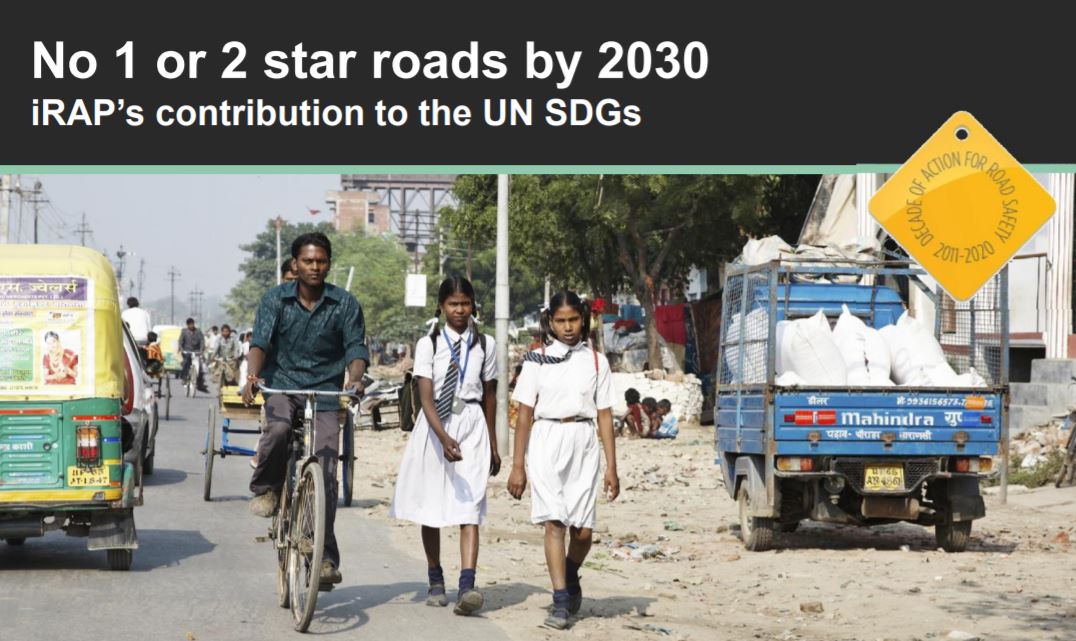
Sep 28, 2014 | Events, Innovation Workshop, Presentations, Resources
Among the world’s best in road infrastructure safety gathered recently at ARRB’s headquarters in Melbourne, Australia for iRAP’s third Innovation Workshop.
The Workshop was hosted by AusRAP leaders AAA, RACV and ARRB with support from TAC and VicRoads. The Innovation Workshop is a platform for those using iRAP tools and those involved in road infrastructure safety more broadly to transfer their know-how quickly to each other through mutual support and friendly competition.
A collection of 32 presentations from the workshop covers topics such as Star Ratings of roads before-and-after upgrades, targeted road maintenance to improve safety and mobile phone probe data for traffic speed measurements. Participants also had the opportunity to take a tour of recent safety improvements made to the Maroondah Highway.
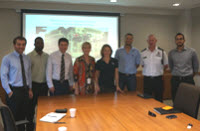
Aug 20, 2014 | Espanol news
Las Clasificaciones por Estrellas preliminares y las opciones de inversión en seguridad para 200 km de carreteras en las Islas Caimán han sido presentadas a actores clave.
En una reunión con el ministro de infraestructura y planeamiento, la Autoridad Nacional de Carreteras, el Servicio de la Policía Real de las Islas Caimán y el Banco de Desarrollo del Caribe, se presentaron opciones para elevar las Clasificaciones por Estrellas de la seguridad de las vías y prevenir muertes y lesiones graves.
iRAP y la Autoridad Nacional de Carreteras están finalizando la evaluación y garantizarán que se implementen las recomendaciones.
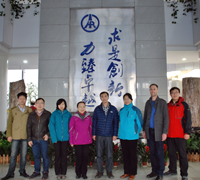
Aug 17, 2014 | Espanol news
El Instituto de Investigación de Carreteras (Research Institute of Highway, RIOH) del Ministerio de Transporte de China ha recibido el premio al Mejor Desempeño (iRAP Asia Pacific Star Performer) otorgado por iRAP Asia Pacífico por el liderazgo de ChinaRAP.
El Programa de Evaluación de Carreteras de China (ChinaRAP), que realiza la Clasificación por Estrellas de sus carreteras en cuanto al riesgo de colisiones y desarrolla planes de contramedidas de seguridad, está siendo utilizado en 14 proyectos de ciudades y carreteras en todo China, ayudando a desarrollar proyectos de desarrollo de más de CNY 9 mil millones (US$ 1.5 mil millones).
Algunos ejemplos de proyectos de ChinaRAP son:
- En Yunnan, el equipo evaluó las carreteras de la ciudad e hizo recomendaciones para realizar mejoras a la seguridad, tales como veredas (aceras), reclasificación de los límites de velocidad y ciclovías, como parte del Proyecto de Transporte Urbano de la Prefectura de Yunnan Honghe, financiado por el Banco Mundial.
- En Shaanxi, el equipo está trabajando estrechamente con diseñadores para elevar las clasificaciones por estrellas respecto a la seguridad de casi 1000 km de vías como parte del Proyecto de Demostración de la Seguridad Vial de las Montañas de Shaanxi, financiado por el Banco de Desarrollo Asiático.
- En Anhui, el equipo trabajó estrechamente con los diseñadores del G316 para elevar las clasificaciones por estrellas de una nueva vía de clase 1. Estas mejoras son financiadas por el gobierno local de Wuhu.
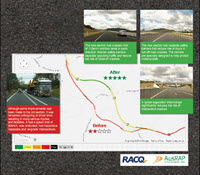
Aug 17, 2014 | Espanol news
Una evaluación de AusRAP realizada por RACQ muestra que las mejoras realizadas en un tramo de 12km de la Autopista Bruce en Queensland, Australia han permitido elevar su seguridad de 2 estrellas a 4 y 5 estrellas.
Anteriormente, el tramo de carretera tenía un límite de velocidad de 90km/h, no estaba dividida y tenía peligros al lado de la vía e intersecciones a nivel. El nuevo tramo tiene dos carriles en cada sentido que están separados por barreras de seguridad en la mediana que reducen el riesgo de colisiones frontales. Las barreras de seguridad laterales a la vía, que están especialmente diseñadas para proteger a las motociclistas, ayudan a reducir el riesgo de lesionarse en colisiones por salida de la vía. Un intercambio en desnivel reduce significativamente el riesgo de colisiones en intersecciones.
Como resultado de las mejoras en ingeniería, el límite de velocidad se pudo incrementar a 110 km/h y aun así el riesgo de muerte y lesiones graves se ha reducido a más de la mitad.
Las mejoras fueron una iniciativa de los Gobiernos de Australia y Queensland.
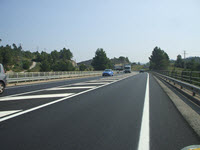
Aug 17, 2014 | Espanol news
En cooperación con la Agencia de Carreteras de Cataluña, RACC ha evaluado 5000 km de vías y ha elaborado un plan de inversión de EUR 42.8 millones que permitiría evitar 14000 muertes y lesiones graves en los próximos 20 años.
Los principales tipos de colisiones que se abordarían son colisiones frontales (que representan 30% de las colisiones) y colisiones en intersecciones (20%).
Las contramedidas propuestas complementarían el trabajo que ya se viene realizando (ver foto a la derecha) e incluirían: barreras en la mediana en calzadas no divididas de un solo carril, achurado central, delineación de las intersecciones y alumbrado público.
RACC y la Dirección General de Infraestructura de Transporte Terrestre (Direcció General d’infrastructures de mobilitat terrestre) han acordado continuar trabajando juntos para ampliar las evaluaciones de iRAP a otras redes, e implementar las actuales recomendaciones a través de los contratos de mantenimiento de carreteras.

Aug 17, 2014 | Espanol news
Ahora están disponibles varios cursos de capacitación para aquellos que quieren aprender a realizar la Clasificación por Estrellas de la seguridad de las vías y el diseño de vías más seguras.
Con los cursos en línea de RAPcapacity, aprenda a realizar evaluaciones viales a su propio ritmo, y de acuerdo con las especificaciones de iRAP. Simplemente regístrese en http://capacity.irap.org/training/rap-courses y seleccione un curso que le convenga.
El curso de iRAP en seguridad vial de la Universidad de Birmingham (Reino Unido) de una semana de duración introduce la tecnología de iRAP para evaluar de primera mano el impacto en la seguridad de la infraestructura vial. Las inscripciones ya están abiertas para el curso de septiembre de 2014.
IRF, socio de iRAP, ha desarrollado una serie de Seminarios en Seguridad Vial (Safer Roads by Design conferencias regionalesde IRF también ofrecen la oportunidad para el desarrollo profesional.

Aug 17, 2014 | Espanol news
El ministro de transporte e infraestructura Edmond Haxhinasto hizo un llamado para que la infraestructura para vías seguras se convierta en una nueva prioridad durante la consulta sobre los primeros resultados de EuroRAP para Albania que contó con la participación de 30 profesionales e invitados técnicos.
El ministro indicó que la reciente inversión masiva que ha realizado Albania en la nueva infraestructura vial ha generado problemas de seguridad que deben ser abordados antes de que se puedan construir carreteras nuevas. El proyecto SENSoR ya ha Clasificado por Estrellas los primeros 500 km de carreteras de Albania, mostrando contramedidas que pueden centrarse en los problemas de seguridad y los enormes beneficios económicos que traerá la inversión en seguridad.
Las presentaciones de Olivera Djordjevic (Make Roads Safe Hellas, socio líder de SENSoR) y el Dr. Steve Lawson (Fundación para la Seguridad Vial) fueron bien recibidas por el gobierno y por Niko Leka, presidente del Club de Automovilismo de Albania, socio del proyecto en Albania.

Aug 17, 2014 | Espanol news
Más de 300 personas de toda la región se reunieron en la sede de ADB en las Filipinas para la reunión de Seguridad Vial de Asia Pacífico 2014.
Con el tema de “Mejorando la seguridad para nuestros niños”, el evento tuvo cuatro partes: el Seminario de GRSP Asia, el taller de iRAP Asia Pacífico, el Programa de Capacitar a los Capacitadores de ADB/ASEAN y el taller de GNCAP.
Los participantes en el taller de iRAP tuvieron la oportunidad de escuchar acerca de las mejoras a la seguridad vial que permitirán elevar las Clasificaciones por Estrellas en China, India y las Filipinas. Aquí puede descargar las presentaciones del taller.
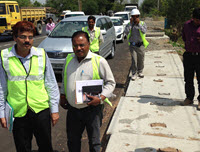
Aug 17, 2014 | Espanol news
En los estados indios de Gujarat y Kerala ya se están realizando las mejoras financiadas por el Banco Mundial que permitirán optimizar significativamente las Clasificaciones por Estrellas de la seguridad vial.
Junto con medidas más tradicionales, tales como carriles más anchos y bermas pavimentadas, los diseños incluyen aceras con vallas de seguridad, cruces peatonales ‘elevados’, paradas de autobús, farolas alimentadas por energía solar y elementos de pacificación del tránsito.
Los diseños también introducen “túneles verdes” que preservan los árboles al lado de la vía – los cuales representan un peligro de seguridad – mediante la colocación de barreras de seguridad. Puede descargar aquí las presentaciones sobre las mejoras realizadas.
Al mismo tiempo, ya se están realizando las nuevas inspecciones de seguridad vial de aproximadamente 4000 km de carreteras en Tamil Nadu y Uttar Pradesh.
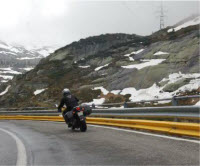
Aug 17, 2014 | Espanol news
Con la jubilación del actual Director Ejecutivo, John Dawson, EuroRAP está buscando nombrar a un nuevo Presidente Ejecutivo (CEO).
Esta es una gran oportunidad para trabajar con un equipo talentoso además de autoridades viales, clubes de automovilismo, líderes políticos e investigadores para salvar vidas durante el Decenio de Acción para la Seguridad Vial.
EuroRAP se estableció como un programa de apoyo a EuroNCAP y cuenta con miembros en 29 países asociados. Los miembros de EuroRAP han evaluado cientos de miles de kilómetros de carreteras en toda Europa, y la influencia del programa está creciendo a nivel mundial.
Si estuviese interesado en liderar esta organización galardonada a nivel internacional para enfrentar el reto de lograr carreteras más seguras, les aliento a que presenten su solicitud.
Rob McInerney
Presidente Ejecutivo, iRAP
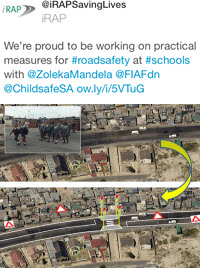
Aug 17, 2014 | Espanol news
Recientemente, ingenieros del Municipio de Ciudad del Cabo llevaron a cabo una capacitación en el uso de los resultados de iRAP y elaboraron una serie de planes conceptuales para mejorar la seguridad en puntos clave alrededor de las escuelas primarias de Sivile, Imbasa y A.C.J Phakade.
Este trabajo es parte de un enfoque pionero que introduce el concepto de infraestructura vial segura para proteger a los escolares, junto con educación y conocimientos en seguridad vial para los niños y profesores de Takalani Sesame y Childsafe.
La evaluación inicial de iRAP realizada en Ciudad del Cabo encontró que un porcentaje significativo de las vías alrededor de las escuelas estaban en las categorías de riesgo de 1 a 2 estrellas, el más alto para peatones.
El proyecto ha sido financiado principalmente por una donación de Janssen, una empresa de Johnson & Johnson, colaborador corporativo del Decenio de Acción a nivel mundial. El apoyo técnico y financiero adicional para el proyecto fue provisto por WorleyParsons, IVECO y la Fundación FIA. El Consejo de Investigación Médica está coordinando el monitoreo y evaluación del proyecto.

Aug 12, 2014 | News
Engineers from Cape Town City Council recently undertook training in the use of iRAP results and developed a series of concept plans to improve safety at key points around Sivile, Imbasa and A.C.J Phakade primary schools.
The work is part of a pioneering approach, introducing safe road infrastructure to protect school children, combined with road safety education and awareness for children and teachers from Takalani Sesame and Childsafe.
The initial iRAP assessment conducted with the City of Cape Town found that significant percentages of the roads around the schools are in the highest-risk 1- and 2-star categories for pedestrians.
The project is primarily funded with a donation from Decade of Action global corporate supporter Janssen, a Johnson & Johnson company. Additional financing and technical support for the project was provided by WorleyParsons, IVECO, and the FIA Foundation. The Medical Research Council is coordinating the monitoring and evaluation of the project.

Aug 12, 2014 | News
With the current Managing Director, John Dawson, retiring, EuroRAP is seeking to appoint a new CEO.
This is an outstanding opportunity to work with a talented team and road authorities, motoring clubs, political leaders and researchers to save lives during the Decade of Action for Road Safety.
EuroRAP was established as a sister program to EuroNCAP, and has members across 29 partner countries. EuroRAP’s members have assessed hundreds of thousands of kilometres of roads across Europe, and the program is growing in influence globally.
If you are interested in leading this award-winning international organisation in the challenge of making roads safe, I encourage you to submit your application.
Rob McInerney
CEO, iRAP

Aug 12, 2014 | News
Preliminary Star Ratings and safety investment options for 200km of roads in the Cayman Islands have been presented to key stakeholders.
At a meeting with the Minister for Infrastructure and Planning, the National Road Authority, the Royal Cayman Islands Police Service and the Caribbean Development Bank, options to lift road safety Star Ratings and prevent deaths and serious injuries were canvassed.
iRAP and the National Road Authority are finalise the assessment and ensure that recommendations are implemented.

Aug 11, 2014 | News
World Bank-financed upgrades that will significantly improve road safety Star Ratings are now underway in the Indian States of Gujarat and Kerala.
Alongside more traditional measures, such as wider lanes and paved shoulders, the designs include sidewalks with safety fences, ‘raised’ pedestrian crossings, bus stops, solar powered street lights and traffic calming.
The designs also introduce “green tunnels” that preserve roadside trees – which are a safety hazard – by using safety barriers. Presentations about the upgrades are available for download.
At the same time, new road safety inspections of approximately 4,000km of roads are also now underway in Tamil Nadu and Uttar Pradesh.

Aug 11, 2014 | News
More than 300 people from across the region gathered at ADB headquarters in the Philippines for Asia Pacific Road Safety 2014.
With a theme of “Improving Safety for Our Children”, the event comprised four parts: the GRSP Asia Seminar, iRAP Asia Pacific Workshop, ADB/ASEAN Train the Trainer Programme and GNCAP Workshop.
Participants in the iRAP Workshop had the opportunity to hear about road safety improvements that will lift Star Ratings in China, India and the Philippines. Presentations from the workshop are available for download.

Aug 11, 2014 | News
Minister of Transport and Infrastructure Edmond Haxhinasto called for safe road infrastructure to be the new priority as he joined 30 professional and technical guests for consultation on the first EuroRAP results for Albania.
The Minister said Albania’s recent massive investment in new road infrastructure had led to safety problems which must be addressed before more new roads could be built. The SENSoR project has now Star Rated the first 500 km of Albania’s roads showing countermeasures which can target the safety problems and the huge economic benefits from investing in safety.
Presentations from Olivera Djordjevic (Make Roads Safe Hellas – SENSoR lead partner) and Dr Steve Lawson (Road Safety Foundation) were welcomed by the government and by Niko Leka, President of the Automobile Club of Albania, the project partner in Albania.

Aug 11, 2014 | News
Numerous training courses are now available for those who want to learn to Star Rate roads for safety and design safer roads.
With RAPcapacity online courses, you learn how to undertake iRAP-specification road assessments, at your own pace. Simply log-onto http://capacity.irap.org/training/rap-courses and select a course that suits you.
The week-long University of Birmingham (UK) iRAP course in Road Safety introduces the iRAP technology for evaluating the safety impact of road infrastructure first hand. Enrolments are now open for the September 2014 course.
iRAP partner, the IRF, has developed a series of Road Safety Seminars (Safer Roads by Design™) to provide road authorities with best practices and latest technologies that can be implemented to meet a country’s commitment to the Decade of Action. IRF regional conferences also offer opportunities for professional development.
































